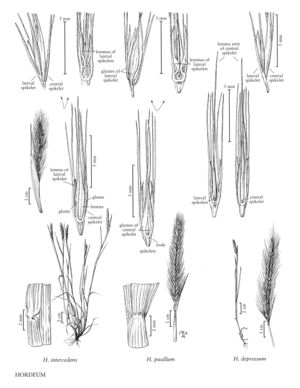Difference between revisions of "Hordeum pusillum"
FNA>Volume Importer |
imported>Volume Importer |
||
| (3 intermediate revisions by 2 users not shown) | |||
| Line 20: | Line 20: | ||
-->{{Treatment/Body | -->{{Treatment/Body | ||
| − | |distribution=Wash.;Del.;D.C;Wis.;Ariz.;N.Mex.;Fla.;Wyo.;N.J.;Tex.;La.;Mass.;N.H.;Tenn.;N.C.;S.C.;Pa.;N.Y.;Calif.;Nev.;Va.;Colo.;Alta.;B.C.;Ala.;Kans.;N.Dak.;Nebr.;Okla.;S.Dak.;Ark.;Ill.;Ga.;Ind.;Iowa;Idaho;Conn.;Maine;Md.;Ohio;Utah;Mo.;Minn.;Mich.;Mont.;Miss.;Ky.;Oreg. | + | |distribution=Wash.;Del.;D.C.;Wis.;Ariz.;N.Mex.;Fla.;Wyo.;N.J.;Tex.;La.;Mass.;N.H.;Tenn.;N.C.;S.C.;Pa.;N.Y.;Calif.;Nev.;Va.;Colo.;Alta.;B.C.;Ala.;Kans.;N.Dak.;Nebr.;Okla.;S.Dak.;Ark.;Ill.;Ga.;Ind.;Iowa;Idaho;Conn.;Maine;Md.;Ohio;Utah;Mo.;Minn.;Mich.;Mont.;Miss.;Ky.;Oreg. |
|discussion=<p><i>Hordeum pusillum</i> grows in open grasslands, pastures, and the borders of marshes, and in disturbed places such as roadsides and waste places, often in alkaline soil. It is native, widespread, and often common in much of the Flora region. Its range extends into northern Mexico, but it is not common there.</p> | |discussion=<p><i>Hordeum pusillum</i> grows in open grasslands, pastures, and the borders of marshes, and in disturbed places such as roadsides and waste places, often in alkaline soil. It is native, widespread, and often common in much of the Flora region. Its range extends into northern Mexico, but it is not common there.</p> | ||
|tables= | |tables= | ||
| Line 38: | Line 38: | ||
|illustrator=Cindy Roché;Annaliese Miller | |illustrator=Cindy Roché;Annaliese Miller | ||
|illustration copyright=Utah State University | |illustration copyright=Utah State University | ||
| − | |distribution=Wash.;Del.;D.C;Wis.;Ariz.;N.Mex.;Fla.;Wyo.;N.J.;Tex.;La.;Mass.;N.H.;Tenn.;N.C.;S.C.;Pa.;N.Y.;Calif.;Nev.;Va.;Colo.;Alta.;B.C.;Ala.;Kans.;N.Dak.;Nebr.;Okla.;S.Dak.;Ark.;Ill.;Ga.;Ind.;Iowa;Idaho;Conn.;Maine;Md.;Ohio;Utah;Mo.;Minn.;Mich.;Mont.;Miss.;Ky.;Oreg. | + | |distribution=Wash.;Del.;D.C.;Wis.;Ariz.;N.Mex.;Fla.;Wyo.;N.J.;Tex.;La.;Mass.;N.H.;Tenn.;N.C.;S.C.;Pa.;N.Y.;Calif.;Nev.;Va.;Colo.;Alta.;B.C.;Ala.;Kans.;N.Dak.;Nebr.;Okla.;S.Dak.;Ark.;Ill.;Ga.;Ind.;Iowa;Idaho;Conn.;Maine;Md.;Ohio;Utah;Mo.;Minn.;Mich.;Mont.;Miss.;Ky.;Oreg. |
|reference=None | |reference=None | ||
|publication title= | |publication title= | ||
|publication year= | |publication year= | ||
|special status= | |special status= | ||
| − | |source xml=https:// | + | |source xml=https://bitbucket.org/aafc-mbb/fna-data-curation/src/200273ad09963decb8fc72550212de541d86569d/coarse_grained_fna_xml/V24/V24_343.xml |
|subfamily=Poaceae subfam. Pooideae | |subfamily=Poaceae subfam. Pooideae | ||
|tribe=Poaceae tribe Triticeae | |tribe=Poaceae tribe Triticeae | ||
Latest revision as of 16:23, 11 May 2021
Plants annual; loosely tufted. Culms 10-60 cm, erect, geniculate, or ascending; nodes glabrous. Sheaths glabrous or slightly pubescent; ligules 0.2-0.8 mm; auricles absent; blades to 10.5 cm long, to 4.5 mm wide, sparsely to densely pubescent on both sides. Spikes 2-9 cm long, 3-7 mm wide, erect, often partially enclosed at maturity, pale green. Glumes straight, not divergent at maturity. Central spikelets: glumes 8-17 mm long, 0.5-1.5 mm wide, distinctly flattened near the base; lemmas 5-8.5 mm, usually glabrous, sometimes sparsely to densely pubescent, awned, awns 3.5-9.5 mm; anthers 0.7-1.8 mm. Lateral spikelets usually sterile; glumes to 18 mm; lower glumes distinctly flattened, more or less winged basally; lemmas 2.5-5.7 mm, usually awned, awns to 1.8 mm, rarely unawned; anthers 0.6-1.2 mm. 2n = 14.
Distribution
Wash., Del., D.C., Wis., Ariz., N.Mex., Fla., Wyo., N.J., Tex., La., Mass., N.H., Tenn., N.C., S.C., Pa., N.Y., Calif., Nev., Va., Colo., Alta., B.C., Ala., Kans., N.Dak., Nebr., Okla., S.Dak., Ark., Ill., Ga., Ind., Iowa, Idaho, Conn., Maine, Md., Ohio, Utah, Mo., Minn., Mich., Mont., Miss., Ky., Oreg.
Discussion
Hordeum pusillum grows in open grasslands, pastures, and the borders of marshes, and in disturbed places such as roadsides and waste places, often in alkaline soil. It is native, widespread, and often common in much of the Flora region. Its range extends into northern Mexico, but it is not common there.
Selected References
None.
